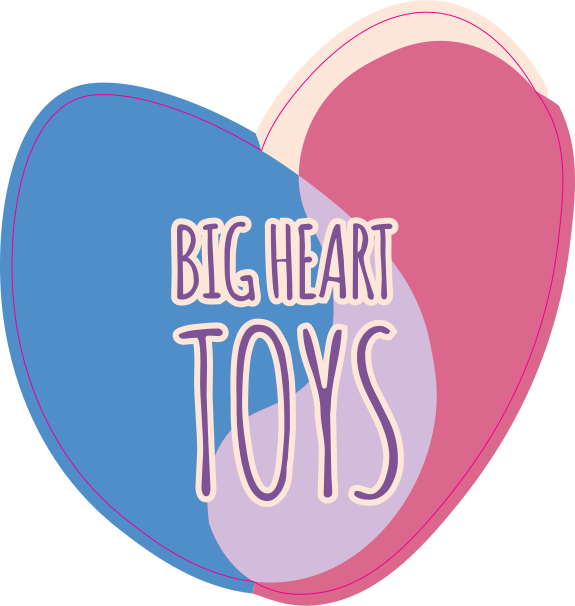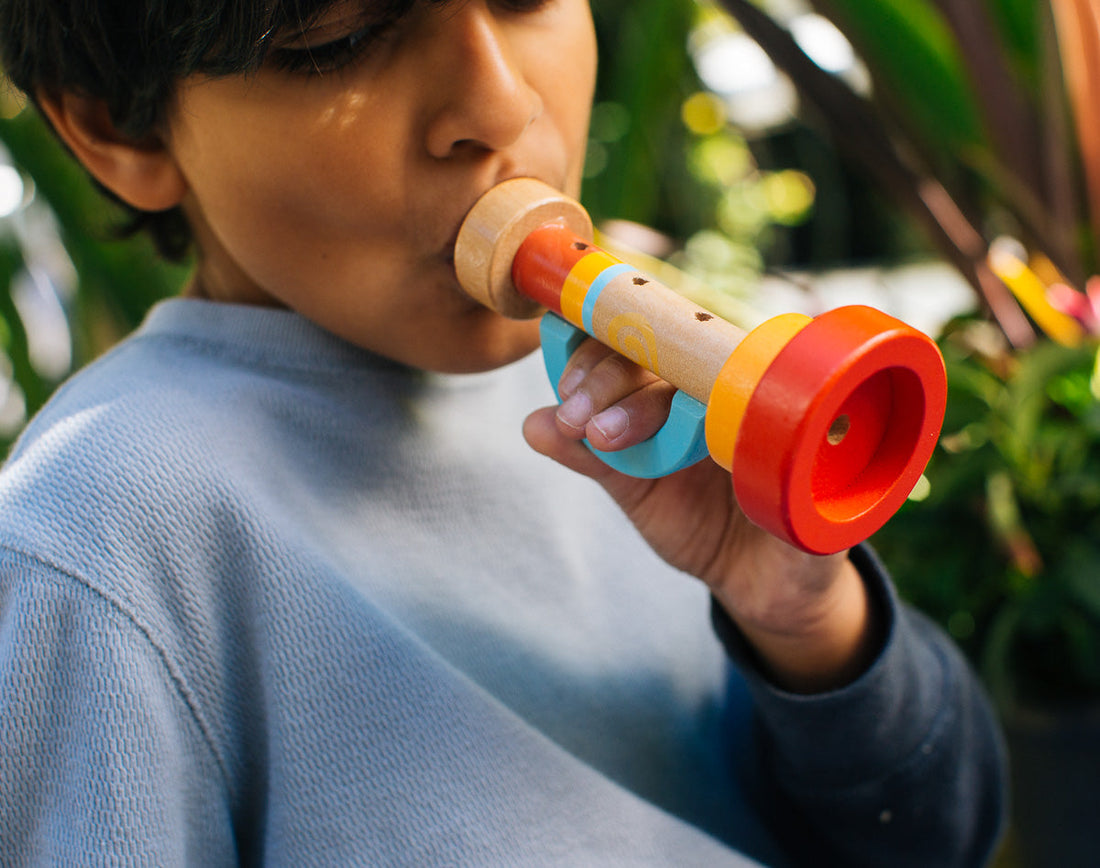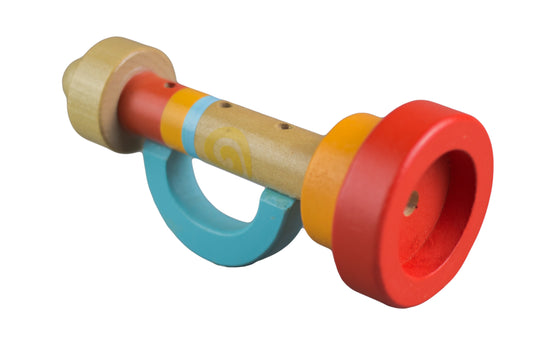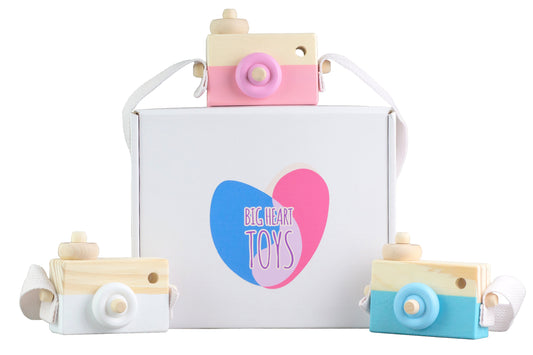Musical toys can have a profound impact on children with autism. Each note serves as a guiding force, shaping cognitive development, enhancing communication skills, and weaving sensory integration into a unique experience for little ones. The universal language of music creates a space where neurodiverse children can thrive.
What Are Musical Toys?
Musical toys are designed to engage children in the realm of music while fostering cognitive and sensory development. These toys come in various forms, such as wooden instruments or electronics that produce sounds.
Their primary purpose is to introduce little ones to the joy of creating and appreciating music from an early age. Big Heart Toys recognizes the importance of incorporating musical elements into children's play experiences. By integrating musical toys into their product line, we aim to provide both entertainment and a means for children to explore rhythm, pitch, and coordination.
Through these musical interactions, children can develop a deeper understanding and appreciation for the world of sound, promoting both creativity and cognitive growth.
8 Benefits of Musical Toys for Children With Autism
Musical toys play a crucial role in the development and well-being of children with autism, offering a range of benefits that extend beyond entertainment. These toys serve as valuable tools for emotional expression and motor skill development, addressing specific needs and challenges faced by individuals on the autism spectrum.
1. Permits Emotional Expression
Musical instruments provide a unique avenue for children with autism to express their emotions. When verbal communication might be challenging, these toys become a medium through which they can convey feelings. For instance, a child may play a fast, upbeat rhythm to express excitement or a slow, calming rhythm to convey a sense of tranquility. The inherently universal nature of music allows for non-verbal emotional expression, fostering a deeper understanding of emotions and providing an outlet for self-expression.
2. Improved Motor Skills
Engaging with musical toys contributes significantly to enhancing both gross and fine motor skills in children. Activities like striking a drum, shaking a maraca, or pressing piano keys require precise and intentional movements, promoting improved hand-eye coordination and fine motor control.
The repetitive actions involved in playing these instruments offer a therapeutic and enjoyable way for children with autism to develop essential physical abilities.
3. Rich Sensory Stimulation
Musical toys offer a multi-sensory experience that goes beyond just auditory engagement. Toys of this variety provide rich sensory stimulation by incorporating various elements that appeal to the auditory, visual, and tactile senses. The different sounds produced by various musical toys, ranging from tinkling chimes to rhythmic drum beats, engage the auditory senses.
The vibrant colors and textures of these toys contribute to a visually stimulating experience. The tactile aspect, through the act of touching and manipulating the instruments, further enhances the overall sensory integration for children with autism, providing an immersive sensory experience.
4. Encourages Social Interaction
Musical instruments play a vital role in fostering social interaction among children with autism. Since music is often a shared activity, these toys become a bridge for social engagement. Collaborative play involving musical instruments encourages turn-taking, cooperation, and communication, which are essential skills for developing social interactions.
Playing a musical instrument in a group setting promotes a sense of belonging, as children take turns contributing to the collective sound. This shared experience enhances social skills and creates opportunities for meaningful connections and friendships among children on the autism spectrum.
5. Supports Cognitive Development
Participating in musical play promotes cognitive development in children with autism. Engaging with these toys involves memory, attention, and thinking skills, all of which contribute to overall cognitive enhancement.
Remembering a specific rhythm or sequence of notes while playing a musical instrument requires your child to exercise their memory. The cognitive demands of creating and replicating musical patterns provide a dynamic mental workout, which can help improve cognitive abilities in areas like memory recall, pattern recognition, and problem-solving skills.
6. Increased Focus and Attention
The interactive and captivating nature of musical toys can significantly increase a child's focus and attention span. When engrossed in creating a specific rhythm or tune, children naturally channel their concentration, honing their ability to stay focused on a particular task.
The sensory-rich experience of playing musical instruments provides a stimulating environment that captures a child's attention, promoting sustained engagement. Through these activities, children with autism can develop and enhance their ability to concentrate, a skill that extends beyond musical play into various aspects of daily life.
7. Calming and Soothing Effect
Certain rhythms and sounds produced by musical toys can have a soothing effect, which is particularly beneficial for children with autism who may experience anxiety or sensory overload. The rhythmic and repetitive nature of musical play creates a comforting environment, providing a predictable and structured sensory experience.
A child experiencing heightened emotions or sensory sensitivity may find comfort in listening to or creating soft, slow rhythms on a musical toy. The therapeutic qualities of music contribute to emotional regulation, offering a valuable tool for managing stress and promoting a sense of calm for children on the autism spectrum.
8. Boosts Self Confidence
Engaging with musical toys and successfully mastering a tune or rhythm can significantly boost a child's self-confidence and self-esteem. The sense of accomplishment derived from producing sounds fosters a positive self-perception.
A child may feel a sense of pride and achievement after successfully playing a tune on a xylophone or beating out a rhythm on a drum. The process of learning and mastering musical skills not only provides a creative outlet but also empowers children with autism, instilling a newfound confidence in their abilities. This boost in self-esteem can extend beyond musical activities, positively influencing various aspects of their everyday lives.
How Can Parents Incorporate Musical Toys Into Their Child's Routine?
Incorporating musical toys into a child's routine can be an enriching experience with a range of developmental benefits. Parents play a pivotal role in introducing these toys into their children's daily activities, fostering creativity, and supporting various aspects of their growth.
Here are some effective ways parents can seamlessly integrate musical toys into their children's routines.
Start With Simple Instruments
Simple, few-step instruments are easier for a child to handle. Instruments like shakers, bells, or small drums allow for a gentle introduction to the world of music. You could also choose instruments that don’t produce sound but give your child the look and feel of a real instrument to get them started. Beginning with uncomplicated instruments ensures that children can enjoy the experience without feeling overwhelmed.
Make It a Regular Activity
Consistency is key when incorporating music into a child's routine. Establish a regular time for musical play, whether it's a designated play session each day or integrating musical elements into existing routines. Making it a consistent activity helps create a sense of familiarity and anticipation for the child.
Use Visual Aids
Visual aids can enhance the musical experience for children. Consider incorporating colorful visuals or simple illustrations that correspond to the sounds produced by the instruments. Visual aids provide additional sensory stimulation and make the musical activity more engaging and interactive.
Encourage Exploration
Allow children the freedom to explore different musical toys and experiment with various sounds. Encourage them to use their imagination and creativity while playing. Exploration fosters a sense of curiosity and helps children discover the unique qualities of each instrument.
Engage in Interactive Play
Participate actively in musical play with your child. Join them in creating rhythms, singing along, or even dancing to the music. Interactive play not only strengthens the parent-child bond but also enhances the overall musical experience for the child.
Use Them To Express Emotions
Encourage children to use musical toys as a means of expressing their emotions. Whether it's playing a lively tune when excited or creating soft rhythms for relaxation, musical toys offer a non-verbal outlet for emotional expression. This helps children develop a healthy relationship with their emotions.
The Bottom Line
There are incredible benefits of integrating musical toys into the routines of children with autism, encompassing emotional expression, motor skill practice, and rich sensory stimulation. Beyond entertainment, these toys play a crucial role in supporting development, fostering creativity, and nurturing emotional well-being. Recognizing their profound impact, it is clear that instruments offer a therapeutic and enriching experience for children with autism.
To explore the diverse range of toys tailored for this purpose, check out our collection here at Big Heart Toys. Whether you're a parent, caregiver, or educator, our toys are designed to create meaningful developmental experiences.
Stay connected by signing up for our newsletter or exploring our blog for insightful information on the benefits of play. Join us in cultivating a world where every child can thrive.
Sources:
Cognitive development and sensory play | MSU Extension
Recognizing, Understanding, and Managing Emotions | Autistic Children and Teenagers | Raising Children
Music Therapy for People with Autism Spectrum Disorder | PMC






